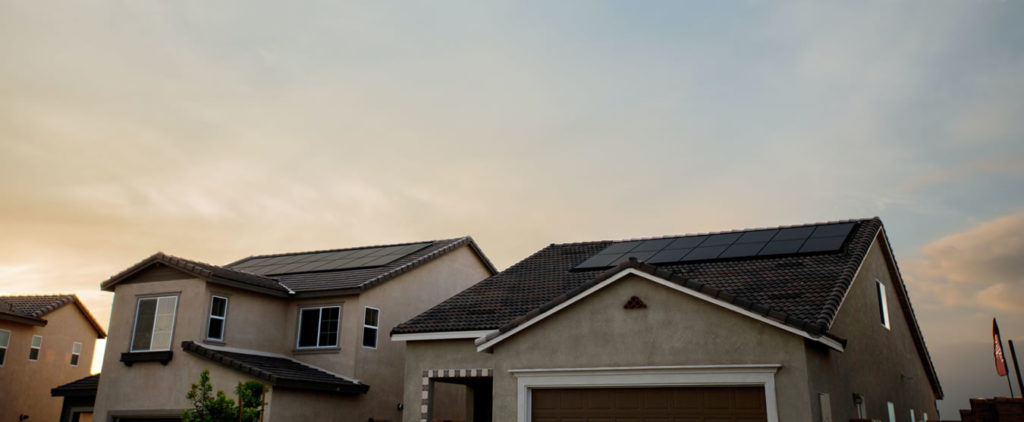Quick Guide To Selecting
The Right Parts For
Your Residential Solar System
Many customers who have decided to go solar, face their first hurdle in selecting the right equipment for their PV system. As with any selection process involving multiple options, you want to be well informed about what each option has to offer. Solar equipment is no exception, but it is a lot easier than you might think. We put together the following guide to help with your selection process of residential solar panels and grid-tie inverter.

How To Choose
The Right Solar Panels
When it comes to residential solar panels, the technology has reached a point where all products, so long as they come from a reputable manufacturer, will perform well on your roof. This means there are several options, and you can’t make the wrong choice. The final decision comes down to personal preference.
Monocrystalline vs. Polycrystalline
Solar Panels
This a never-ending debate and the bottom line is that efficiency only matters when space is significantly limited, such as on a sailboat. The reality is that monocrystalline cells are more efficient than polycrystalline cells. Still, poly cells have come a long way in closing the gap and making the difference almost negligible.
Also, there is a misconception that poly cells produce less power than mono cells, but that is not true. A solar panel rated at 300W will produce energy at the rated power regardless of the type of cell that it uses. The only difference, in this case, is that a monocrystalline panel is smaller in (physical) size.
A common question is which one performs best in overcast weather – the short answer is that monocrystalline cells tend to perform better in low-light conditions.
At BOXED we only offer monocrystalline solar panels.
USA-Made vs. Overseas
Solar Panels
This one is an entirely personal preference. If you are dedicated to using locally manufactured products, you will opt for panels made in the United States. If you are willing to pay a premium, you are guaranteed to have one of the best solar panels ever made, and depending on where you live, you might qualify for additional incentives.
Residential solar panels made in megawatt factories overseas, mainly in Asia, are usually not consumed in their country of origin – they are shipped to countries with high PV demand.
To sell their panels in other countries, manufacturers must meet local requirements for quality and safety. If you are in the United States and you buy a solar panel made in Vietnam, for example, the chances are that the same panel will meet European standards as well as the American requirements, so the quality should not be a cause for concern.
When buying Asian-made solar panels, we recommend looking for two requirements: a reputable manufacturer of Tier 1 modules that sells large quantities of panels globally, and a manufacturer with offices and inventory in the United States.
All the panels used in BOXED systems meet the requirements in the previous paragraph. We carry US-made panels as well.
Black or Non-Black
Solar Panels
The color of a solar panel is entirely dependent on your personal preference. Monocrystalline cells are darker—bluish-gray or sometimes close to black. Polycrystalline cells lean towards the blue color, with multiple crystals reflecting different shades of blue. The cell color cannot be selected or changed, but you can choose the color of the aluminum frame and the back-sheet (which is the background color behind the solar cells).
The frame of the panel typically comes anodized in natural aluminum or black. Most residential solar panels now come with black frames to improve their appearance. When people refer to an all-black or a Black-on-Black (BoB) solar panel, they are referring to a panel (usually monocrystalline) with a black aluminum frame and a black back-sheet.
An all-black solar array, where the mounting rails and hardware are also black, tends to blend more effectively with the roof and is preferred among homeowners who are more particular about the appearance of their roof. The black finish adds cost to the final product, so you will notice that PV panels that come with an aluminum mill-finish frame and a white back-sheet are cheaper than their all-black counterparts.
One point worth mentioning is that residential solar panels with black back sheets operate at a higher temperature, therefore losing efficiency. The loss is not significant, but it will increase the operating temperature of the array, especially in hot climates. If efficiency is your ultimate goal, we recommend a white back-sheet, though an all-black panel is not a bad tradeoff when appearance matters.
We choose all-black solar panels for our BOXED systems, but other options are available.
Selecting The Inverter
For Your Solar Panels
Choosing the appropriate inverter or inverters in a PV system plays a more critical role than the solar panels. It is the piece of equipment that makes the most considerable difference to the performance of your PV system. Click on the following link to learn how to Select The Right Grid-Tie Inverter for your residential solar system.

